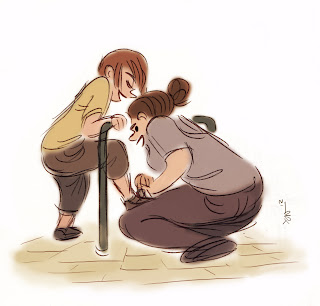Some sketches I did at the mall today! I think my favorite subject to draw by far is human interaction, particularly those with parents and their kids.
I can't remember where I got this but I think it was from an art book that stressed on the importance of outdoor life drawings due to the true performances and genuine emotions that comes in variations. I believe this has been discussed by many other artists too so it won't come off as a new thing. The idea is that in an in-class life drawing session, the models are being taught to pose to give you their best poses & silhouettes so you can learn to capture their gesture and anatomy, but more often than not, those poses often lacks real subtle acting because most of the time, they are not meant to be element of acting references. Even if those poses have some sort of underlying meaning or story to them, the subtleties of real and honest emotion is almost non-existing.
To take an example, imagine an in-class life drawing session where the model is being told to put his left foot forward and bend down to pick up his cap that has fallen off his head. The story behind his pose is pretty prevalent. Cap falls off, he bends down to reach for his cap. Fair enough. Now take another example where you go outside and see a man whose cap is blown off his head. He bends forward to reach for his cap, but this time instead of bending his knee down, he's on a wheelchair. Now there's a much better story to tell, and there's an obstacle to it. Take away the wheelchair and make him a man with a perfectly fine pair of legs and again the wind blows his hat off, but this time it lands on a lake, or next to a raging bulldog in his ex-girlfriend's front yard. The point that I'm trying to get across here is that by going outside to draw, you can witness more varieties of stories and genuine acting as opposed to sitting only in an in-class life drawing session where you can observe only so much that is being thrown at you. Of course you can let your imagination run wild and imagine the exact same situations that's been given above, but what is "life" drawing if you do not learn to capture from the richest essence of life itself?
In reality, the man in the wheelchair might attempt to pick up the hat in a totally different way than your in-class life drawing model would. What if the man sitting on the wheelchair used to be a celebrated soccer player? Now being unable to walk and sitting on a wheelchair feeling helpless, his attempt in picking up his cap would be way different than the"just a man in the wheelchair" you imagined. Every inch of bent he takes and every twist and turn explains his character and attitude in response to the given situation. Surely from looking at the man in the wheelchair on the outside, it's almost impossible to tell he was an ex-soccer player who still carries in him some pride, but THERE IS a HISTORY behind that character that drives him to ACT in a certain way. It is history that delivers substance. I'm not suggesting that life drawing models cannot act because they certainly know how to and there are very well trained life drawing models out there, but often times they are up there posing for a different purpose. Sometimes the model may be instructed to emulate the quality of a stage actor to deliver a story for narrative illustration purposes, but even so I think there needs to be a balance between these two practices.
It's being stressed so many times by many great artists and mentors that the best way to learn good acting and genuine performances is to go out there on the street, the park, the mall, wherever you go, carry a sketchbook with you and SKETCH SKETCH SKETCH!! Drawing from life outside lets you see how people react to the agenda around them with true honesty and from there you can increase your visual and acting vocabulary.
Again I'm not implying here that one practice is superior than the other because they share equal weight among themselves. Generally I think both going to a life drawing class and outdoor sketching is a much needed practice as they relatively feed off each other and an artist cannot risk losing either one.
The great Dalai Lama said "Learn the rules so you know how to break them properly." and I think that applies to the art of filmmaking, illustrating, storytelling and even disciplines that are not along those lines. You cannot run without learning how to walk.
-Yon







































